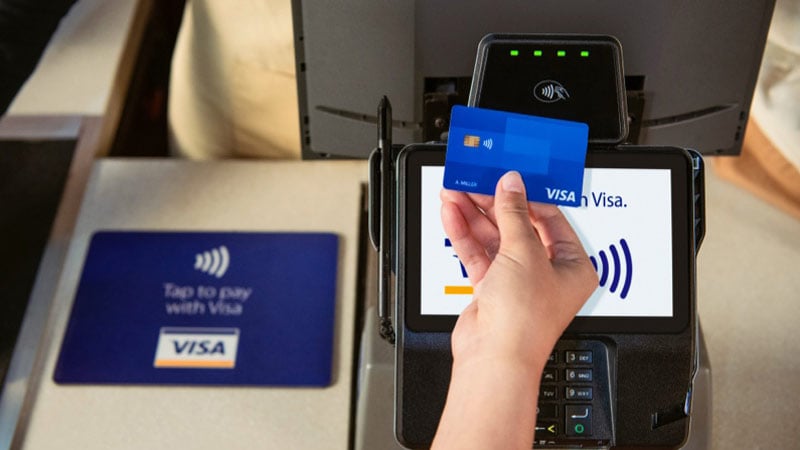"It was the best of times, it was the worst of times, it was the age of wisdom, it was the age of foolishness..." You know the rest. Visa can certainly relate to this iconic opening sentence from Charles Dickens' novel. However, this story does not represent a tale of two cities, but a tale of two companies. The two giants of the electronic payment industry, Visa and MasterCard.
This piece is not intended to unearth the next 10 to 20 bagger. Both of these companies are already well established in the market. Instead, the purpose is to discover which is the top company in the electronic payment industry, and if there is room for further growth.
By the numbers
Visa and MasterCard appear very similar. While MasterCard may be a more expensive buy for the average investor, its P/E ratio remains consistent with industry competitors. Year-over-year earnings per share slightly favored MasterCard, which reported an increase of 21 percent from $5.55 to $6.96 for the second quarter ending in June. Visa followed closely behind, increasing its year-over-year earnings per share by 20% to $1.88.
Another strength of each company is the lack of debt on the balance sheet. When a company is able to pay off its short- and long-term debts without serious problems year after year, it's clearly gotten something right.
Visa's innovative programs have given the company the opportunity to acquire a larger portion of market share in the industry. Total processed transactions on the payment network VisaNet for the third quarter increased 14% to 15 billion. Consumers are beginning to use Visa debit and credit cards more often than MasterCard counterparts. Visa's annual sales have increased each year by 17%, 14%, and 13% for 2010, 2011, and 2012, respectively. This is followed by MasterCard, which has still seen strong increases in sales of 9%, 21%, and 10% over the last three years.
MasterCard CEO changes the company culture
At a time when a company's financial statements are not enough for investors to make important decisions, many have looked toward more qualitative data for answers. Corporate culture has become one of these important tools.
Foolish investors have often taken this approach to investing in a company. The production of a company does not come directly from computers or equations, but from the employees and their minds. In a day and age when many business models are based on thoughts and ideas instead of tangible products, it is increasingly important to keep these minds working efficiently by keeping them as happy as possible.
For an investor researching a company from the outside, it can be difficult to get a feel for the work environment of a particular company. One website, glassdoor.com, posts anonymous reviews by current or former employees. The website provides a place for written reviews and ratings.
On Glassdoor.com, MasterCard as a company was rated a 3.5 out of 5 drawn from 162 reviews. With a quick scan of the first 20 written reviews on the page, I concluded that many employees feel they have great benefits and ample opportunities for growth within the company. President and Chief Executive Officer Ajay Banga received an 88% approval rating among 81 reviews. The most consistent complaint was the workload, which may not necessarily be a bad thing.
Visa, on the other hand, received worse reviews on this site. Out of 358 reviews, Visa received a 2.7 rating out of 5, mostly because of poor senior management and company culture. Many reviews highlighted the good pay as a positive, but noted the lack of flexibility and organization as big problems. Chief Executive Office Charles Scharf received a 64% approval rating out of 44 reviews. It is important to note that Scharf only took this position at the end of 2012, two years after Banga began at MasterCard. It will be interesting to see how the company culture changes over the next few years. This is definitely something to keep an eye on for Visa.
MasterCard increases credit card volume, Visa opposite
Probably the largest difference between the two companies is the distribution of their card programs over their payment network. While MasterCard has grown its share in the debit card business, Ajay Banga mentioned in May that he would like to extend partnerships in the credit card business to new retailers and banks.
For the company's third quarter ending in June, Visa recently reported that its total transactions increased 12%. Out of the 22.3 billion transactions over the year, 63% of these were from debit cards.
The number of Visa debit cards also increased 9% over the last year, with 1.33 billion cards compared to 801 million credit cards now in circulation. For its second-quarter earnings report ending in June, MasterCard reported an increase of 2% in its debit program Maestro to 729 million cards. The number of credit cards increased 12% to 1.21 billion.
Federal judge decision to block cap on swipe fee hurts Visa
From the most recent earnings reports of both companies, it's clear that Visa holds a much larger stake in the debit card industry. With more transactions and cards in circulation, there is much more debit card action on VisaNet relative to MasterCard's distribution. Unfortunately for Visa, this business plan just hurt them big time.
In an article posted on The Wall Street Journal, Alan Zibel, Brent Kendall, and Michael R. Crittenden note that before the 2010 Dodd-Frank Act, banks charged an average of $0.44 per card transaction. Retailers who accepted electronic payment for their merchandise would incur these charges. Many retailers were upset with this, resulting in the act that capped these so-called "swipe charges" at $0.21 per transaction.
Even with the decreased cap, retailers such as Burger King and Starbucks still complained that the fee was too much. At the end of July, a judge dismissed a Federal Reserve rule, allowing for the fee banks charged retailers to swipe debit cards to be decreased even lower than $0.21.
With this ruling, Visa will lose what were once highly profitable deals with banks that were able to charge these high swipe fees. Since the ruling, shares of Visa have fallen roughly 14%. MasterCard shares saw less of a decline due to its lower share in the debit card industry.
Looking ahead
While these stocks share many similarities, Visa's leadership in the debit card industry hurt it this summer. At this point, its stock is one to watch. A strong business model, sponsorship campaign, and new leadership give it room to grow in the future, but right now, these are a lot of ifs.
On the other hand, MasterCard is already seeing results from President and CEO Ajay Banga in the first few years of his term. Once the dust settles on the swipe fee changes, MasterCard will need to reevaluate its share on credit and debit distribution, depending on the ruling. As it saw with Visa, too heavy of a share in one industry may hurt it in the long run. But for now, look for its stock to continue to climb.







